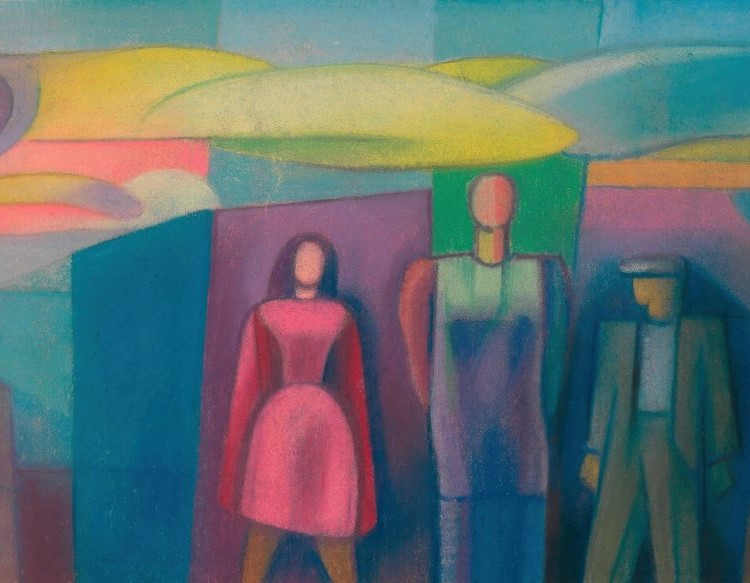According to Buddhism, mind isn’t physical. If you’re a Christian or a Muslim, you’d refer to some non-physical part of yourself, a soul or a spirit; the Hindus call it an atman, a self; the Greeks talk about an essence.
There’s no equivalent in Buddhism: we have mind, or consciousness, and we have body. “Mind,” however, is used more broadly: it refers to our concepts, feelings, thoughts, emotions, our psychoses, our goodness; unconscious, subconscious, instinct: all of this is our mind.
The entire spectrum of our inner experiences is our mind.
It is necessarily non-physical. It isn’t the body. It’s not the brain. Without insulting neuroscientists, you could say that what goes on in the brain is an indicator of what’s going on in our mind – at least at the grosser level.
The job of the mind is cognition, and clearly Buddhism asserts subtler levels of cognition not posited by neuroscience. By using the sophisticated psychological skill called single-pointed concentration meditation, established by the brilliant Indian yogis and scholars well before the Buddha, we can plumb the depths of our mind and access the more refined levels of our own capacity for cognition, which don’t depend upon the brain.
Il giornalista medico americano Dick Teresi, nel suo libro The Undead – non parla di zombie! – descrive la confusione nella professione medica oggi sulla definizione di morte, innescata dalla pratica di donare gli organi in punto di morte – persone che pensano siano morte tornano in vita; esperienze fuori dal corpo, esperienze di pre-morte. Ha citato un medico che diceva di poter affermare con certezza che la coscienza non è una funzione del cervello; non so cosa sia, ha detto, ma questo poteva affermarlo.
According to the Buddhist Vajrayana, after you’ve stopped breathing at death, that’s just the ceasing of your gross consciousness; it can be up to three days before the subtler consciousness leaves the body.
This subtle consciousness is our mental states, and we experience these in our dreams and while we’re in a coma or under anesthetic.
I visited a friend in hospital a few times who was in a deep coma. I’d asked the students of two of the lamas to pray for her. When I was there I’d say prayers and mantras close to her and occasionally I’d say, “Judy, His Holiness Sakya Trizin is praying for you, Dzongsar Khyentse Rinpoche is praying for you.” I visited her again after she came out of her coma and she said the only thing she remembered from those weeks of unconsciousness was this husky voice saying exactly those words! She thought it was a blue lady coming through the window!
So in just the same way that a person who’s dreaming or in a coma or under anesthetic, whose gross consciousness has temporarily stopped functioning, can be aware of what’s going on around them, so too can a person who’s brain-dead and whose subtle consciousness hasn’t left the body yet – it can take up to three days after the breath stops.
The Undead parlava di una donna che stava donando i suoi organi. Lì era sul tavolo operatorio, morta, per quanto riguardava i medici, e l’infermiera che monitorava il battito cardiaco riportò che non appena tutto era pronto per aprirla, il cuore passò da 100 a 200 battiti al minuto. Teresi si chiedeva di cosa potesse essere ansiosa una persona morta! È ragionevole dedurre che stesse avendo una di quelle esperienze fuori dal corpo.
Our mind is not the handiwork of anyone else, neither a creator nor your parents. Our parents are the source of our body, but our mind is our own. What’s its source? Previous moments of itself: it’s like a chain of mental moments, each moment necessarily coming from a previous one. We can track these moments back and will inexorably get back to the first moment of conception.
We all know that the moment before conception the egg was in our mother’s body and the sperm was in our father’s body. The mind? That comes, simply, from the previous moment of that very river of non-physical mental moments.
So when did I begin, we ask? We assume that there has to be a first moment. If we have a religious philosophy that asserts a creator, we track ourselves and everything else back to a creator, don’t we? The Christians have extensive teachings on how it’s possible for there to be a First Cause.
We have the primordial assumption that way back somewhere there has to be a first moment. But for the Buddha if everything’s driven by the law of cause and effect, by definition you cannot have a first cause. In his various discussions with scientists, His Holiness the Dalai Lama said – and I’m paraphrasing – “Big bang? No problem! Just not the first big bang, that’s all.” That’s pretty tasty!
According to Buddha, we do not track any part of our being back to a creator. We don’t need creating! And that’s where the law of karma comes in: as His Holiness the Dalai Lama likes to say, it’s like “self-creation.” Basically every millisecond of what any being thinks and does and says just naturally programs the mind, leaves seeds in the mind that will ripen in the future as our own experiences, our own person.
So, what’s the experiential implication of this view? It’s that our mind and what’s in it are our own; we come into this life at the first second of conception fully programmed with our own past tendencies, no one else’s; we are our own creator.
And our mind is not set in stone. The etymology of the word “buddha” is tasty: “budh” implies the utter eradication of the negative states of mind and “dha” implies the development to perfection of the virtues.
That’s our potential – the enlightenment of buddhahood – and it’s the very nature of our mind.



